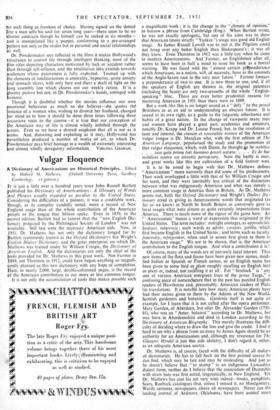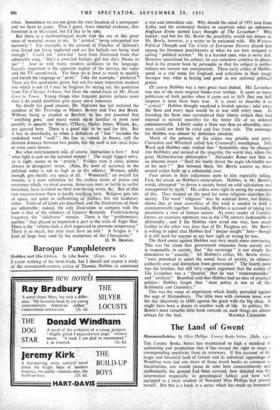Vulgar Eloquence
it Dictionary of Americanisms on Historical Principles. Edited
IT is just a little over a hundred years since John Russell Bartlett published his Dictionary of Americanisms : A Glossary of Words and Phrases usually regarded as peculiar to the United States. Considering the difficulties of a pioneer, it was a creditable work, though, as its compiler candidly noted, more a record of New England usage than of the whole contribution of the American people to the tongue that Milton spake. Even in 1859, in the Second edition, Bartlett had to lament that the "new English Dic- tionary projected by the Philological Society of London" was not available. Still less were the necessary American aids. Now, in 1951, Dr. Mathews has not only the dictionary longed for by )3artlett (commonly known as the Oxford Dictionary) but Wright's r nglish Dialect Dictionary, and the great enterprise, on which Dr. Mathews was trained under Sir William Craigie, the Dictionary of :American English. And the dictionaries are only the chief of the fools provided for Dr. Mathews in this great work. Not Farmer in 1889, not Thornton in 1912, could have begun anything so magnifi- cently planned as this new dictionary with any hope of completion. 1-lere, in nearly 2,000, large, double-columned pages, is the record of the American contribution to our more or less common tongue.
It is not only the accumulation of tools that makes possible such a magnificent work ; it is the change in the "climate of opinion," to borrow a phrase from Cambridge (Eng.). When Bartlett wrote, he was not exactly apologetic, but one of his aims was to show that American (more strictly " Yankee ") usage was good old English usage. As James Russell Lowell was to put it, the Pilgrims could not bring over any better. English than Shakespeare's ; it was all they knew. Even Thornton in 1912 was a little coy when he came to modern Americanisms. And Farmer, an Englishman after all, seems to have been in half a mind to issue his book as a horrid warning. He was faced with the "almost certain pitponderance which Americans, as a nation, will, of necessity, have in the counsels of the Anglo-Saxon race in the very near future." Farmer foresaw a preponderance of two to one. It is now three to one, and, if all the speakers of English are thrown in, the original patentees (including the Scots) are only two-sevenths of the whole " English- speaking " bloc. There are even better prudential reasons for mastering American in 1951 than there were in 1889.
But a work like this is no longer issued as a " defy " to the proud Britishers or as an aid to understanding an obscure future. It is issued in its own right, as a guide to the linguistic inheritance and habits of a great nation. In the, change of viewpoint Many men and women have played a great part, academics and amateurs, notably Dr. Krapp and Dr. Louise Pound, but, in the revolution of taste and interest, the clarum et venerabile nomen of the American vulgar tongue is Dr. Mencicen who, with the first edition of The American Language, popularised the study and the promotion of that vulgar eloquence, which, with Dante, he thought* be nobilior . . . turn quia prima fuit humano generi usitata. . . . Et de hac nobiliori nostra est intentio pertractare. Now the battle is over, and great works like this are cultivation of a field forever won.
It is to be noted to begin with that Dr. Mathews defines " Americanism " more narrowly than did some of his predecessors. Their work overlapped a little with that of Sir William Craigie and his team, and they were inevitably less critical of the distinction between what was indigenously American and what was merely a more common usage in America than in Britain. As Dr. Mathews points out, both the Oxford Dictionary and Wright's Dialect Dic- tionary erred in giving as Americanisms words that originated (as far as we know) in North -15-r South Britain or conversely gave as local usages what were almost or quite certainly importations from America. There is much more of the rigour of the game here. An " ' Americanism ' means a word or expression that originated in the United States. The term includes: outright coinages, as appendicitis. hydrant, tularemia; such words as adobe, campus, gorilla, which first became English in the United States ; and terms such as faculty, fraternity, refrigerator, when used in senses first given to them in the American usage." We are to be shown, that is, the American contribution to the English tongue. And what a contribution it is Of course, many of the words are of narrowly local interest. Thus new items of the flora and fauna have been given new names, modi- fied Indian or Spanish or French names, or an English name has been given to some bird or_plant roughly recalling an English bird or plant or, indeed, not recalling it at all. For " hemlock " is "any one of various American evergreen trees of the genus Tsuga," a confusing piece of nomenclature that in the past has puzzled English readers of Hawthorne and, presumably, American readers of Plato (in translation). It is notable here how many American plants have had their names given to them by the Adams of the New World, Scottish gardeners and botanists. Gardenia itself is not quite an example, for I learn that it is not called after the opera performer, Mary Garden, of Aberdeen, but after Dr. Alexander Garden (1730- 91), who was in "Amer. botanist" according to Dr. Mathews, but was born in Aberdeenshire and died in London according to the Dictionary of American Biography. This merely illustrates the diffi- culty of deciding where to draw the line and give the credit. I find it hard to see why a phrase from an essay by James Agate should be an authority for an Americanism and, although my reverence for The Glasgow Herald is just this side idolatry, I don't regard it, either, as an adequate American source.
Dr. Mathews is, of course, faced with the difficulty of all makers of dictionaries. He has to fall back on the first printed source he can find, which may be late and may be misleading. And just as he doesn't believe that "to stump" is an indigenous Lancashire dialect form, neither do I believe that the association of Dunstable with straw hats was first noted, linguistically, in New England. Yet Dr. Mathews has cast his net very wide indeed—books, pamphlets, Sears, Roebuck catalogues (but, unless I missed it, no Montgomery. Ward), sermons, newspapers, above aU newspapers. Never can the leading journal of Ardmore, -Oklahoma, have been quoted more often. Sometimes we are not given the state location of a newspaper and we have to guess. Thus I guess, from internal evidence, that Somerset is in Maryland, but I'd like to be sure. - But there is a methodological doubt that the use of this great mass of material rouses in me. Is " printed " being interpreted too narrowly ? For example, is the counsel of Fletcher of Saltoun:s wise friend not being neglected and are -the ballads not being used enough ? Could not " corn-fed " have been illustrated from that admirable song, "She's a corn-fed Indiana girl but she's Mama to me " ? And so with many modern additions to the language. Equally important is the apparent neglect of the movies, the radio and the TV sound-track. Yet these do at least as much to modify and enrich the language as ". print.", Take, for example, " *dated.") There are five quotations given, but not the most important modern one which is not (if I may be forgiven for saying so), the quotation from The Chicago Tribune, but from the sound-track of Mr. Deeds Goes to Town. Young things who frequent picture palaces more than I do could doubtless give many more instances.
No doubt for good reasons, Dr. Mathews has not imitated the candour of Mr. Partridge or Messrs. Berrey and Van den Berck. Without being as prudish as Bartlett, he has not assumed that "anything goes," and many words made familiar in print (and possibly in speech) by Messrs. O'Hara, Mailer, Jones, Wilson, &c., are ignored here. There is a good 'deal to be said for this. But it has its drawbacks, as when a definition of "line" includes the undefined word " wolf " ; the fine is, indeed, in theory, still the shortest distance between two points, but the wolf is not eanis: lupus or even canis latrans. •• But what entertainment arid, of course, instruction is here And what light is cast on the national temper ! The single biggest entry, as is right, seems to be "prairie.".. Politics runs it close, almost always in derogatory terms. (Alas, the lovel of accuracy in the political notes is not as high as in -the others.) Woman, oddly enough, gets hardly any space- at ill. Womanall," an overall for women, is a poor substitute for the endless terms of praise and reverence which, we must assume, American men; so fertile in verbal invention, have lavished on their ever-loving-Wives; &c. But of that vast treasure-ti ove there is hardly anything here. Religion gets lots of space, not quite as unflattering, as politics, but not laudatory either. Tools of all kinds are described, and the illustrations of-them are admirable ; indeed, the only illustration to compete with the tools is that of the whiskers of General Burnside. Fredericksburg forgotten, the " sideburns " remain. There is the "prothonotary warbler" that played so important a part in the trials of Alger Hiss. There is the "reform club, a club organised to.promote temperance." /here is So. much, but time must have an end ! A brogan is "a kind of large boat used by the oystermen of the Chesapeake." D. W. BROUAN.



































 Previous page
Previous page